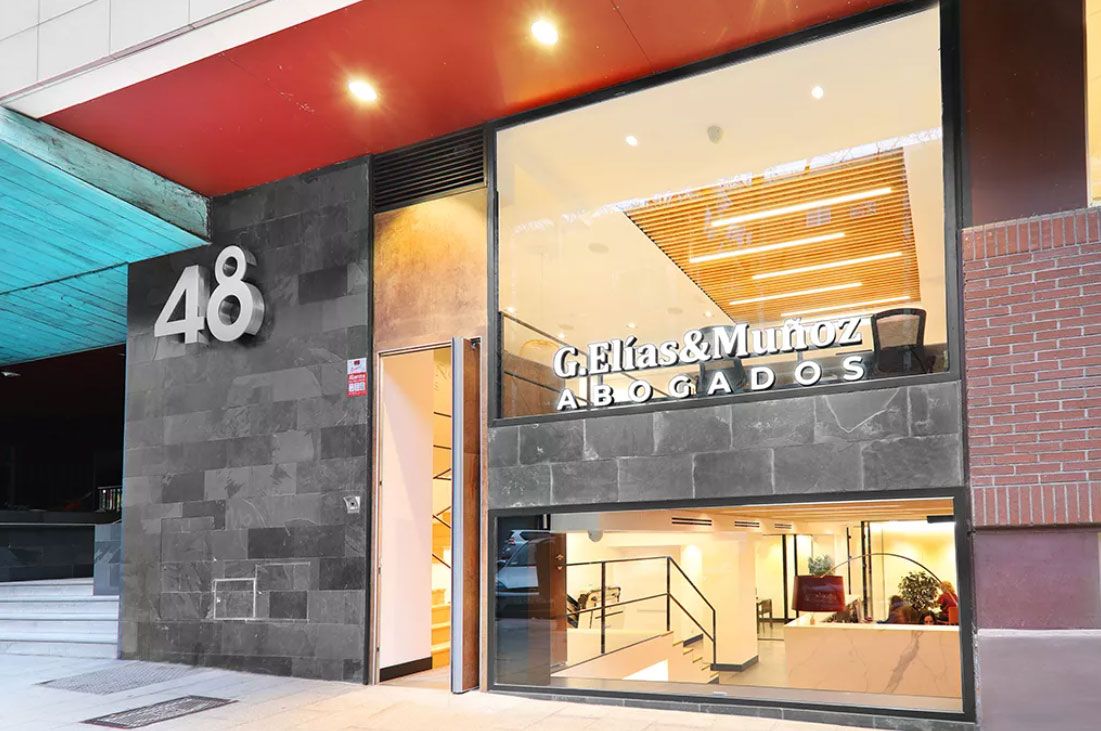Abogados de Divorcios en Madrid
Despacho de abogados de familia matrimonialista expertos en divorcios en Madrid.
Llámanos, somos abogados especializados en divorcios ¡más de 30 años de experiencia!
G.Elías y Muñoz Lawyers de familia cuyo departamento dirige Rus María Muñoz Gómez desde el año 1.994, nuestros bufete de abogados está especializado en separaciones, divorcios y rupturas matrimoniales. Actuamos tanto en Madrid, como en el resto de España. Nuestro equipo de abogados le ayudará y asesorará en su procedimiento de divorcio.

¿Estás pasando por un divorcio? ¡Nuestros abogados y abogadas especializadas en divorcio te ayudarán!
Un divorcio puede suponer una etapa compleja en tu vida. No solo te estás enfrentando a la separación de tu pareja, sino que también te enfrentas a la necesidad de tomar decisiones cruciales que afectarán tu futuro y el de tus seres queridos. En esta situación, contar con el apoyo de un abogado especializado en divorcios puede ser clave para lograr un proceso más tranquilo en lugar de uno lleno de disputas.
¿Por qué elegirnos?
Experiencia
Nuestros abogados tienen más de 30 años de experiencia tramitando casos de divorcio complejos.
Atención personalizada
Cada caso es único. Te ofreceremos soluciones que se ajusten a tu situación.
Apoyo integral
Más allá de la representación legal, te ofreceremos apoyo emocional y asesoramiento durante todo el proceso.
Resolución integral
Nos enfocamos en resolver tu caso con rapidez y de la manera más eficiente posible.
Transparencia y Confianza
Una comunicación cercana y honesta contigo en todo momento es la base de la confianza en el proceso.
El divorcio es un proceso complicado que no hay que afrontar en solitario. Ponemos a tu disposición a nuestro equipo de abogados para apoyarte a superar este reto con la mayor tranquilidad posible.
Divorce lawyers in Madrid. Nowadays, thanks to the reform of the Civil Code in July 2005, spouses can directly access to divorce, contentious or mutual agreement, without having to go through a separation process first.
Marriage is the union of two people, of the same or different sex, by virtue of which, through a public pact for society, they establish a community of life. When this bond is broken, it is broken through separation or divorce proceedings, for which you will need a family lawyer specialising in the matter.
Although Spanish legislation does not expressly regulate the marriage of transsexuals, this situation has been settled in the registry sphere with the resolutions of 8 January 2021 and 31 January 2021 which authorise the marriage of transsexuals who have undergone surgery and with a judicial sentence registered in the Civil Registry agreeing the change of sex, with a person of a different legal sex, even if the biological sex of the contracting parties coincides.
The matrimonial lawyers that our divorce lawyers in Madrid have are those professional lawyers whose experience is related to family law and especially with marital breakups.
In case of marital breakdown contact any of our Law Firms in Madrid. Our matrimonial lawyers have accredited experience in advising on divorce, express divorce or notarial divorce. We will advise you. Fees adapted to each specific case.
¿Necesitas hablar con un abogado especialista en divorcios?
No dejes que el proceso de divorcio te agobie. ¡Estamos aquí para ayudarte a avanzar con confianza y claridad!If you wish, leave us your contact information and we will call you back.
Your online lawyer will provide you with the best service.
Testimonials
Do you want more information with no obligation?
Divorce is the legal form of marriage breakdown. It may be by mutual consent or at the request of only one of the spouses.
Our family lawyers are specialists in handling divorces in the Community of Madrid and the rest of Spain, whether they are divorces by mutual agreement or contentious. Our main office is located in Madrid with branches in Pozuelo and Majadahonda. G.Elías y Muñoz Abogados has lawyers with more than 20 years of experience in divorce and separation proceedings.
If you have decided to initiate divorce proceedings, call us and a divorce lawyer from our law firm in Madrid will advise you.
G.Elías y Muñoz Abogados is a law firm specialised in divorce proceedings, both divorce by mutual agreement and contentious divorce or notarial divorce. We will help you to find the best solution for your divorce, not only from a legal point of view, but also from a personal point of view, with a lawyer specialised in marital breakdown.
We provide answers to all the doubts that may arise during separation or divorce proceedings. Contact us and a divorce lawyer will get to work for you immediately. Fees adapted to the work and specific situation of each client. Possibility of deferred payment without interest.
Divorce and separation
Differences
Every year in Madrid, more than 20,000 couples (married couples and unmarried couples) are involved in family divorce crises, which means that we are faced with a major social phenomenon. Faced with a family breakdown, it can be dealt with by agreement or consensus with the other party (divorce by mutual agreement) or by confrontation (contentious divorce).
Since 2005, it has not been necessary to go through a judicial separation (suspension of the marriage bond, of the obligation to live together) in order to obtain a divorce (dissolution of the marriage bond). In 2021, it is estimated that there will be 110,000 divorces in Spain, of which almost 90% will be divorce proceedings and the rest separations, with a small proportion of annulments. In Madrid, around 12% of the divorces that take place in the whole of Spain are processed.
The fundamental differences between the two options are as follows:
If you divorce, you can subsequently remarry, whereas if you opt for separation you cannot remarry.
If there is reconciliation after the court proceedings, the separation can be annulled only if both spouses inform the court. If there is a divorce decree, reconciliation of the spouses, i.e. the divorce is annulled and the marriage is resumed, is no longer possible, but it is necessary for it to take legal effect again, the spouses must remarry, remarry again.
If you opt for separation and then want to divorce, you will have to go through two legal proceedings, with all the emotional and financial costs that this can entail.
The fact is that since 2005, and given that divorce can be granted without the requirement of prior legal separation, most couples have opted to go directly to court for divorce.
Moreover, neither separation nor divorce are nowadays causal or fault-based, i.e. to be eligible for separation or divorce, only 3 months must have elapsed since the marriage was entered into (whether the marriage is civil, canonical or ecclesiastical).
70% of matrimonial proceedings (separations and/or divorces) are resolved by mutual agreement, while 30% are resolved by contentious proceedings.
Mutual or consensual proceedings are those in which both spouses, in addition to being in agreement with the divorce or separation, agree between them on the measures that will govern with respect to the children, compensatory pensions and marital property. This is set out in what is known as the 'convenio regulador'.
On the other hand, we speak of contentious proceedings when either one of the spouses does not want to divorce and, therefore, it is impossible to reach any type of agreement; or when there is agreement in the divorce, but there is disagreement regarding all or some of the measures that the regulatory agreement should contain (custody of the children, pensions, use of the family home, compensatory pension, alimony, etc.).
In the contentious procedure, it will be the judge who will resolve the discrepancy in relation to the different aspects, agreeing the divorce and imposing the measures that he/she considers fair, after the corresponding trial has been held, as he/she considers that these are the most beneficial for the children or the most equitable between the spouses.
Separation with Children
Separation with Children. Unlike divorces in which there are no children or minors, in separations where there are minor children, there is a figure who is responsible for looking after the interests of the minors: the Public Prosecutor's Office or Public Prosecutor's Office. Although the parents can draw up an agreement by mutual consent, the Public Prosecutor's Office must approve the content or the agreements contained therein relating to the separation or divorce with children.
Separation of property or community property
Separation of property or community property.- Depending on the matrimonial property regime that existed during the marriage, the divorce will determine the extinction of the matrimonial property regime in the event that they were in community of property. If the regime was that of separation of property, there will be no assets to liquidate except for those in joint ownership, which will have to be done in a separate proceeding.
Consensual divorce versus contentious divorce
Advantages
It greatly simplifies the judicial processing of the family break-up, as it avoids the lengthy and uncertain outcome of contentious divorce proceedings.
It is cheaper than contentious proceedings, as both parties can use a single lawyer and solicitor.
Mutual agreement better preserves the future relations of the spouses, which is essential if there are common children, in order to avoid the deterioration that these relations may suffer during a contentious judicial process.
It reduces non-compliance after the Judgment (non-payment of pensions, irregularities in the visiting arrangements, etc.), which is quite common in contentious proceedings.
For all these reasons, at Divorce Lawyers Madrid, we always try to reach an agreement regarding the terms of your divorce, exhausting this possibility before initiating contentious legal proceedings, unless the measures that are intended to be included in the agreement are unacceptable to you or you consider them seriously detrimental to your children.
Contested divorce and divorce by mutual consent
Types of Divorce
In divorce proceedings by mutual agreement, savings are maximised, as both parties can be represented by the same lawyer and solicitor.
In addition, the proceedings by mutual agreement are very agile, taking approximately 3 months to obtain a decision from the filing of the lawsuit by mutual agreement (this is the so-called express divorce).
If the procedure is followed by mutual agreement, there is no appeal against the judgement issued in this procedure, as the procedure is carried out by mutual agreement between the two parties.
The procedure to be followed is to accompany the petition for divorce by mutual agreement with a regulatory agreement, that is to say, the document in which both parties set out the consequences that the divorce will produce:
a) The dissolution of the marriage.
b) The moment from which the divorce takes effect.
c) Who will keep the family home.
d) whether a compensatory pension is to be awarded to either party. This may be for life or for a limited period of time, paid monthly or in a lump sum.
e) whether or not community property is liquidated in the divorce proceedings.
f) All consents given during the marriage are revoked.
g) In the event that the marriage has minor children, the regime of parental authority, visiting arrangements or shared custody shall be determined, as well as the maintenance payments established in favour of the children and the manner and payment of extraordinary expenses.
h) The manner in which family expenses (payment of mortgages, etc.) are to be paid.
i) Likewise, if the spouses are married under the community of property regime, as from the Judgment, the community of property ceases, i.e., although it is not yet stated to whom everything belongs, from this moment onwards, everything they obtain or the debts they incur will be the sole responsibility of each one of them.
Thus, schematically, the extrajudicial and judicial actions for the resolution of a mutual agreement procedure will be as follows:
- Signing of a regulatory agreement: a document in which the measures by which the couple will be governed from the signing of the agreement will be agreed (attribution of custody of the children, attribution of the home, pensions and, if applicable, liquidation of the community property.
- Once the agreement has been signed, a lawsuit of mutual agreement will be drawn up, to which the agreement, the marriage certificate and, if applicable, the birth certificates of the children will be attached as documents.
- Once the application has been filed (which must be signed by a lawyer and solicitor), once the court has issued an order admitting the application for processing, the court will set a date and time for the parties to ratify their application and the content of the regulatory agreement attached to the application.
- Once the agreement has been ratified, if there are minor children, the Public Prosecutor's Office will examine it, in order to ensure that what has been agreed by the parties does not contravene the interests of the minors.
- Subsequently, a Judgment will be issued approving the agreement and the measures contained therein.
- Ex officio and final the Judgment, the Court will agree the registration of the same in the Civil Registry where the marriage is registered.
While in a divorce by mutual agreement the costs and resolution times of a mutual agreement procedure are short, the contentious divorce procedure has a higher economic cost, and the resolution time is also longer, depending on the court to which the resolution corresponds and the saturation of the court.
Thus, while in a mutual agreement procedure the resolution time is usually 3 months (express divorce), the estimated duration for a contentious procedure is usually between six months and a year.
In contentious proceedings, unlike in mutually agreed proceedings, each of the spouses must appear with their own lawyer and solicitor, as they cannot be defended by the same lawyer and represented by the same solicitor.
The contentious proceedings are initiated by the respondent, where the petitioner must set out exhaustively the measures he or she wants to be adopted in the judgment:
- Measures to be adopted regarding parental authority after the divorce.
- Measures to be adopted regarding custody and guardianship. Custody of the children may be single-parent (granted in favour of one parent) or joint custody. In order to determine which of the spouses will have the children, it will be necessary to see what dedication each of them gives to the children.
- Measures to be adopted in relation to the visiting arrangements of the children with the non-custodial parent. The visiting arrangements are a right of the children to be with and enjoy the company of their children.
- The maintenance allowance, i.e., the amount of money that the non-custodial parent must pay to the other parent to cover the expenses of the child, i.e., and as established in Article 142 of the Civil Code, ["...everything that is indispensable for sustenance (food and education), habitation (family home), clothing and medical care"].
- Regime of extraordinary expenses.
- Allocation of the family home, which, according to Article 96 of the Civil Code, "In the absence of an agreement of the spouses approved by the judge, the use of the family home and of the objects of ordinary use therein corresponds to the children and to the spouse in whose company they remain".
- Establishment of compensatory pension. In this case it is necessary to follow the provisions of Article 97 of the Civil Code, which states that "The spouse to whom the separation or divorce produces an economic imbalance in relation to the position of the other, which implies a worsening in his or her previous situation in the marriage, shall be entitled to compensation that may consist of a temporary or indefinite pension, or in a single benefit, as determined in the regulatory agreement or in the judgment".
Schematically, the contentious divorce proceedings will have the following outline:
- The main claim will be filed where the party will make the allegations on which he bases his different petitions in relation to the aforementioned points. In the defendant's pleading, a request may be made for evidence to be taken in advance, either by requiring the defendant to provide a series of documents, or by requesting that public bodies or private entities provide the information required.
- Once the claim has been filed, the defendant is notified and is granted a period within which to reply within the following 20 working days (not counting Saturdays, Sundays or public holidays).
- The defendant shall submit his defence to the claim, together with the evidence he intends to submit in support of his position.
- Once the defendant and the defence have been examined, a date and time will be set by the court for the corresponding hearing where the different evidence will be examined (mainly the interrogation of the plaintiff and the defendant).
- After the hearing, the case files remain in the Court for the Judge to issue a Judgment, and the Judgment establishes the pertinent measures by which the parties will be governed from that moment onwards.
- The judgement handed down at first instance and in contentious proceedings can be appealed before the Provincial Court.
Express Divorce. This type of divorce, commonly known as "express divorce", is a type of divorce that is characterised by its speed and in which both spouses agree by mutual consent on the measures relating to their marital breakdown. It can be processed, in any case, even if there are minor children.
Notarial Divorce. In cases where there are no children or where the children are of legal age, it is possible to process the divorce through a notary, thus avoiding the need to go to court.
Nullity is the ineffectiveness of the marriage due to a cause coetaneous to its celebration and which produces the non-existence of the effects of the marriage from the moment of its celebration, except in cases of putative marriage.
The nullity of the marriage begins from the very moment of its celebration, there is a defect in the consent. Through the nullity, the bond that never existed is destroyed.
Our Law Firm has lawyers specialised in marriage annulment both in Madrid and in the rest of Spain.
Contentious Divorce
Necessary documentation- Literal certification of marriage.
- Verbatim birth certificate of the children.
- Last census registration certificate.
- Deed of marriage settlement, if any.
- Income tax return for the last two financial years.
- Receipts for the children's expenses (schools, extracurricular activities, etc.).
- Receipts for the consumption of the family home.
Divorce by mutual consent
Necessary documentation- Literal certification of marriage.
- Verbatim birth certificate of the children.
- Last census registration certificate.
- Signed divorce agreement.
- Deed of marriage settlement, if any.
Family law news

When two people decide to apply for divorce proceedings, a series of long-term premises must be agreed upon regarding the regulation of behaviour in the family...

Whenever a person dies, his or her property becomes available to his or her legitimate heirs. Whether or not he or she made a will during his or her lifetime...

The will is a document that reflects the last wishes of a subject, that is, how he/she wants to distribute his/her assets among his/her heirs once he/she has...

When the parents die, the house they used as a family home or any other house they owned becomes the property of their heirs. However, there are situations that...

It is possible that, when the parents are still alive, they may decide to donate a house to one of their children, either because they are in a worse financial...

Giving is an act of generosity that one freely disposes of without expecting anything in return in support of another, who accepts it. The recovery of donations...

We cannot ignore the reality that, in many cases, there are parents who ask their ex-partner or the judge for joint custody in order to save on alimony. In fact...

Some couples marry before having children. There are also those who prefer to register only as unmarried partners. However, it is an inescapable reality that...

As you may well know, the Civil Code in force in Spain provides that couples can get married using two different regimes: community property and separation of...

In this article we explain who the forced heirs are and the relationship they have with the reserved portion as determined in article 806 of the Civil Code...

Acceptance with benefit of inventory is one of the concepts that raises the most doubts regarding the collection of inheritances. But what exactly is it and how...

What types of matrimonial property regime are there? When two people decide to get married, it is advisable to choose the matrimonial property regime in which...
